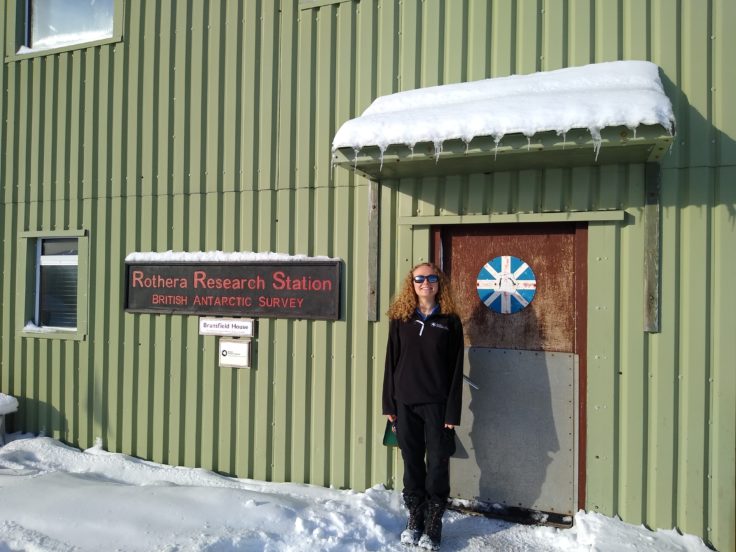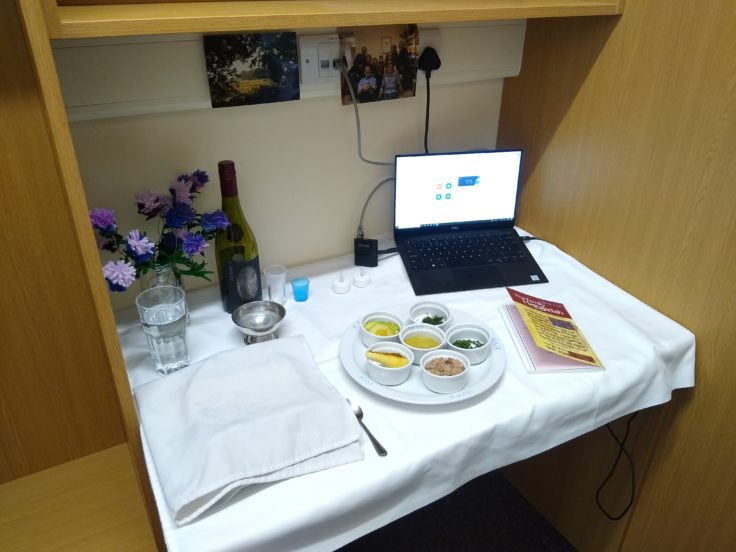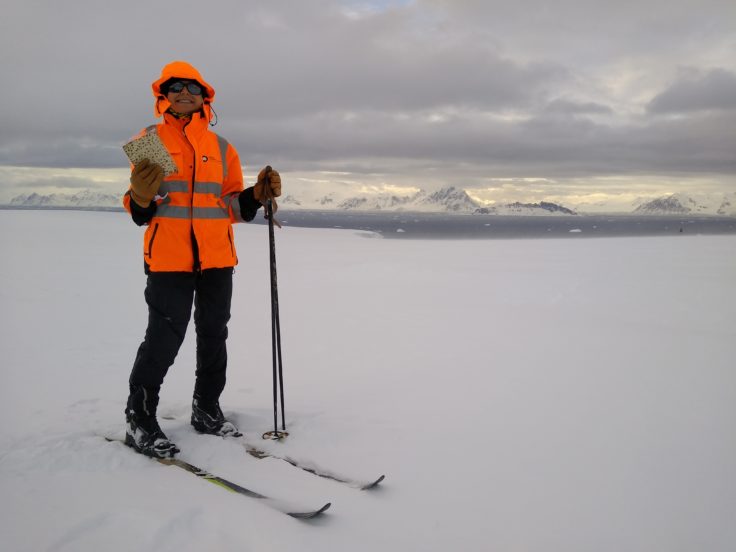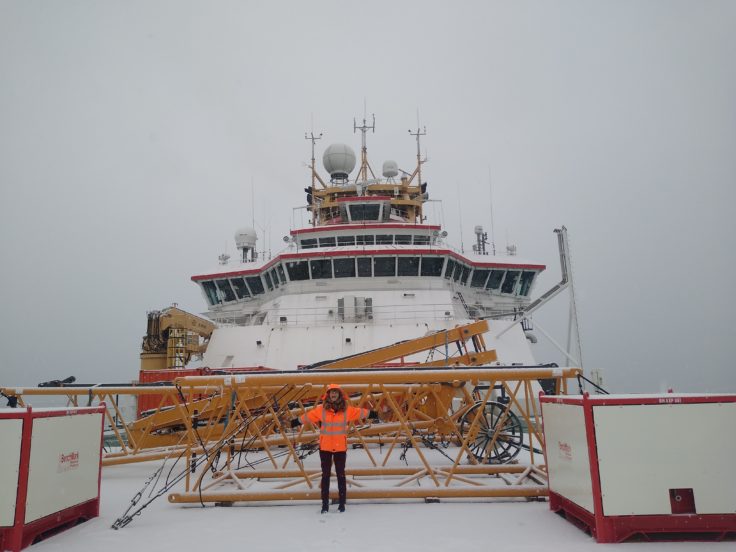Polar Passover
5 April, 2023 Diversity in UK Polar Science
Alysa Hulbert, is an Information Officer at British Antarctic Survey. She spent several months last year working in Antarctica, which coincided with the Jewish festival of Passover or Pesach פֶּסַח. With some help from colleagues on station and a few adjustments, she was able to celebrate on Station and make her first ever Polar Passover a very special one.
The Jewish festival of Passover this year begins at nightfall on Wednesday 5 April. As I have done every year of my life, I will be joining my family around the dining table for an evening of singing, prayers, storytelling, eating, and drinking. But this year as I head out from work, driving from British Antarctic Survey’s HQ in Cambridge to my childhood home in London, my thoughts will be 14,000km away at Rothera Research Station Antarctica, where last year I spent a Passover like no other.

I’m a vegan, I have been for over a decade now, and when I told my friends and family I was going to spend three months in Antarctica their second question (after “how cold is it going to be?”) was “how are you going to eat?”. Well actually, as a modern research station with a team of professional chefs, my vegan diet wasn’t a problem! Of the roughly 150 people on station I wasn’t even the only vegan.
However, when I heard I’d be deployed from February to April, I realised Pesach 2022 was going to be my first away from home. How could I possibly observe this festival, with its many dietary restrictions, without access to fresh fruit and vegetables and a very, very, long way from the nearest kosher supermarket?
Observing Passover
Passover celebrates the Exodus of the Israelites from Egypt, where they had been slaves. As the Bible story goes, Moses repeatedly asked Pharoah to “Let my people go”, but it was only after God sent the ten plagues that Pharoah agreed to let the Israelites flee.
When the Israelites heard they were free to leave Egypt, there wasn’t time to bake their daily bread, so they carried the dough upon their backs which they baked under the hot sun. For this reason, Jews have ever since observed the festival by abstaining from ‘leaven’ – risen dough, for the eight days of the festival. This means no bread, cakes or biscuits, and no pasta, grains or cereals of any kind. Following the Passover diet isn’t so bad if you eat eggs, dairy, meat and fish, but as a vegan, meal planning during Pesach can be pretty tricky…
But back to my Polar Passover. The first night of the festival, Seder night, is the one time of the year the whole family are guaranteed to be in the same room around the same table at the same time, much like Christmas dinner.
A Special Seder Night
The pandemic had set the precedent for holding Seder night virtually, so in Antarctica I managed to Zoom into my family Seder from my little room on my laptop, having packed a copy of the Seder night prayer-book, the Haggadah, to take down with me. The centerpiece of the Seder table is the Seder plate; a dish of several symbolic foodstuffs each with a role to play in the evening’s proceedings. But how could I recreate this at Rothera?
Like any undertaking in Antarctica, some planning was necessary. One of the items on the plate is horseradish maror, which is eaten to recall the bitterness of slavery. For this, I brought a tiny tin of wasabi powder South with me. For the other items I worked with the chefs to get what I could. Salt water, symbolising the tears of the enslaved Israelites, was easy enough.
I used frozen parsley for the karpas, and frozen chives for the chazeret (more bitter herbs). For the lamb shankbone, reminiscent of the Passover sacrifice, I carved a frozen parsnip (I usually use a ‘bloody’ fresh beetroot back at home). And used frozen avocado slices for the egg (again, a vegan substitution I make back in the UK).
For the charoset, a sweet dip that represents the mortar the Israelites used in building the dwellings of their oppressors, I blended tinned apple with cinnamon, some cooking wine, and the last few dates and walnuts I could find on Station. Everyone was keen to try a taste! With a white tablecloth borrowed from the dining room to lay over my desk, wearing the one dress I’d packed, and with battery-powered tealights in the place of the usual candlesticks, I recreated a little piece of home from home.

But wait! What about the matza?! If there was one thing associated with Pesach, it’s matza; unleavened bread. This is a cracker made following a strict protocol from nothing but flour and water. Well thankfully my dad was on the case; posting two boxes from the UK weeks in advance. Whilst colleagues gleefully tore open their chocolate-stuffed care packages from home, dug out from the bulging mail bags arriving from the Falkland Islands via the BAS intercontinental aircraft the Dash-7, I unwrapped my boxes of dry matza.

Working in a diverse community in a remote environment
Pesach celebrates freedom, and I am so lucky to work for an organisation where not only can I practice my religious freedoms, something that sadly can never be taken for granted, but for an organisation that actively facilitated my celebration of the festival.
Despite the multiple challenges of feeding a diverse community in a remote environment with limited ingredients, the Rothera kitchen team and wider community went above and beyond to understand my needs. Not only did I get hot meals to eat after a long shift loading cargo onto the RRS Sir David Attenborough, but they were tasty too!
It’s this generosity and respect that I’ll remember this Passover, and all my Passovers to come. Chag Pesach sameach everyone – Happy Passover, Happy Easter, and Ramadan Mubarak!
